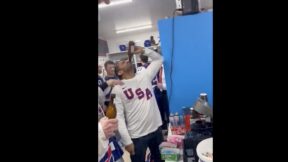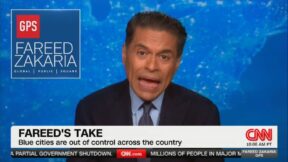Farmer Kicked Off GB News After Schooling Host On Post-Brexit Realities In Agriculture
GB News’ host and Brexiteer Tory MP Jacob Rees-Mogg resorted to kicking farmer David Catt off air on Wednesday after his gaslighting failed to win over the guest, who argued Brexit had “destroyed” the ability of wholesalers, like him, to sell into the European market.
Catt joined Rees-Mogg on Wednesday for the four year anniversary of leaving the European Union in a dedicated show.
“Good evening, Mr. Catt,” the host said. “Thank you very much for joining me. Will you be joining me in celebrating the four years since we departed from the EU?”
Catt replied: “No, not whatsoever. It hasn’t benefited British agriculture one iota. In fact, it’s damaged us. It’s destroyed our ability to export to the EU. We had built massive trade in beef and sheep, lamb, fish, dairy products, which now we’re not allowed to sell. We can’t sell to the EU because of the red tape… Union. The paperwork and red tape involved, it makes it prohibitive financially.”
Stunned, the host said: “Overall, our exports have grown to the EU since we left.”
“That’s down to gas,” the farmer replied.
Rees-Mogg began: “We’ve had a protected market for EU agricultural produce, which has been hugely to the disadvantage of British consumers. We’ve had higher prices because we have been a captive market for the EU. And we can be more competitive, and our farmers can be more competitive. And as we open up free trade deals with other countries, there’s a chance for you to export to them.”
“No, I disagree entirely,” Catt replied, before explaining that while in the EU British farmers had the protection of the common agricultural policy (CAP) which guaranteed cost and supply if food met certain regulations.
Rees-Mogg said: “Every farmer I ever spoke to loathed the CAP, the constant regulation, the interference…”
Catt continued before laying out clearly for the Brexiteer host the state of farming in the UK: “The CAP guaranteed a food supply at a known cost over the last 30 or 40 years because it guaranteed supply. We are in a situation in this country at the moment where agriculture and farming is falling off a cliff. In Kent, here, the Garden of England, where I am, apple trees are being grabbed at a far faster rate than ever before. We’re planting vineyards. We can’t get any labour. Well, the labour we can get now comes, instead of from Europe freely, it comes from Uzbekistan, Afghanistan, all around the world, on visas, which are very expensive, creating a lot of red tape. So most farmers, fruit farmers down here, are packing up.”
The host, clinging to Catt’s mention of attempts by UK farmers to pivot to vineyards in order to remain profitable. Catt was quick, however, to dismiss the idea of this as a victory because these projects were in their “initial stages.”
“But they’re having to go there,” Rees-Mogg said. “That’s great because markets are developing and the regulations on wine are being eased to make it more competitive and less regulated.
This is a real opportunity that we couldn’t have in the EU.”
“No businessman puts a barrier between itself and its biggest customer. That does not happen. That does not happen,” the guest said.
“Our biggest single trading partner is the United States, not the EU,” the host pushed back.
“Not for foodstuffs,” Catt replied. “We’re now left at the vague whiz of the supermarkets who dictate the prices.”
Ress-Mogg returned: “But the farmers were always complaining about the supermarkets when we were in the EU. That’s no change. It’s exactly the same.”
“Because government policies allowed them to be where they are, and they’re controlled to a much greater degree than they are here,” Catt continued.
However, the Brexiteer host had had enough of hearing Catts hard truths and decided to promptly end the conversation.
“Well, thank you very much, David. It’s good of you to join me.”
New: The Mediaite One-Sheet "Newsletter of Newsletters"
Your daily summary and analysis of what the many, many media newsletters are saying and reporting. Subscribe now!






Comments
↓ Scroll down for comments ↓